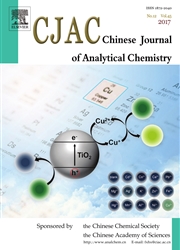

 中文摘要:
中文摘要:
大气细颗粒物(PM2.5)污染已成为严峻的环境问题,探究PM2.5的毒性效应和机理变得尤为重要。本研究利用基于液相色谱/质谱的代谢组学技术,分析经PM2.5悬混液气管滴注暴露后成年雄性大鼠睾丸代谢组的全局变化,采用偏最小二乘判别分析法和非参数检验进行统计分析。结果表明,PM2.5暴露组大鼠睾丸的油提和水提代谢指纹谱均可与对照组实现准确区分,表明PM2.5暴露对大鼠睾丸的整体代谢网络产生了显著影响,最终鉴定出56个差异代谢物。通路分析显示,PM2.5暴露会引起大鼠睾丸的氨基酸和核苷酸代谢紊乱、类固醇激素代谢失衡以及脂类代谢异常,而这些重要通路可能是PM2.5生殖毒性的关键分子事件。
 英文摘要:
英文摘要:
Air born fine particulate matter ( PM2. 5) pollution is a serious environmental problem, and it is very important to study the toxicity effect and mechanism of PM2. 5. In this study, a liquid chromatography- mass spectrometric (LC-MS) method on the basis of metabolomics technique was developed to investigate the metabolic disruption effect and reproductive toxicity mechanism of PM2.5 on rat testis. The profile of aqueous and organic testis metabolic extracts were acquired, and then analyzed by partial least square-discriminant analysis and nonparametric test. The results showed that control group and treatment group were clearly discriminated in the scoring plot of PLS-DA models, indicating PM2. 5 treatment induced significant difference in testis metabolome. A total of 56 differential metabolites were identified, and further pathway analysis suggested that PM2. 5 exposure induced amino acid and nucleotide metabolism disorder, steroid hormone metabolism imbalance and abnormal lipid metabolism. These important pathways may be the key molecular events in the PM2.5 reproductive toxicity.
 同期刊论文项目
同期刊论文项目
 同项目期刊论文
同项目期刊论文
 Urinary Metabolic biomarkers link oxidative stress indicators associated with general arsenic exposu
Urinary Metabolic biomarkers link oxidative stress indicators associated with general arsenic exposu Environmental exposure to arsenic may reduce human semen quality: associations derived from a Chines
Environmental exposure to arsenic may reduce human semen quality: associations derived from a Chines Perfluorooctanoic acid induces gene promoter hypermethylation of glutathione-S-transferase Pi in hum
Perfluorooctanoic acid induces gene promoter hypermethylation of glutathione-S-transferase Pi in hum Association of environmental benzo[a]pyrene exposure and DNA methylation alterations in hepatocellul
Association of environmental benzo[a]pyrene exposure and DNA methylation alterations in hepatocellul On-line background cleanup followed by high-performance liquid chromatography with tandem mass spect
On-line background cleanup followed by high-performance liquid chromatography with tandem mass spect Proteomic analysis of perfluorooctane sulfonate-induced apoptosis in human hepatic cells using the i
Proteomic analysis of perfluorooctane sulfonate-induced apoptosis in human hepatic cells using the i Online background cleanup followed by high-performance liquid chromatography with tandem mass spectr
Online background cleanup followed by high-performance liquid chromatography with tandem mass spectr An integrated metabonomics and transcriptomics approach to understanding metabolic pathway disturban
An integrated metabonomics and transcriptomics approach to understanding metabolic pathway disturban Urinary Metabolomics Revealed Arsenic Internal Dose-Related Metabolic Alterations: A Proof-of-Concep
Urinary Metabolomics Revealed Arsenic Internal Dose-Related Metabolic Alterations: A Proof-of-Concep A Nested Case-Control Study Indicating Heavy Metal Residues in Meconium Associate with Maternal Gest
A Nested Case-Control Study Indicating Heavy Metal Residues in Meconium Associate with Maternal Gest 期刊信息
期刊信息
